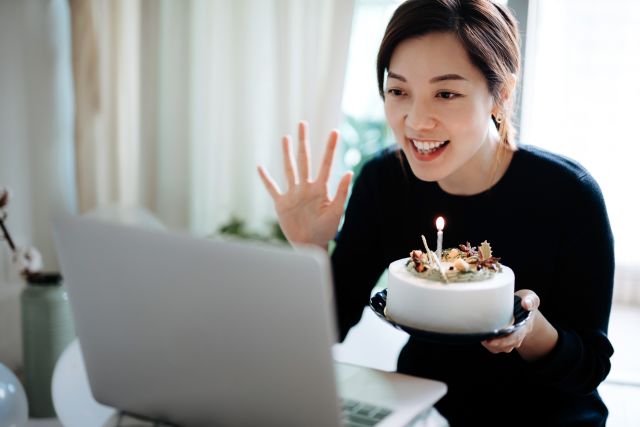Updated on July 30, 2024.
During the COVID-19 pandemic, Americans were forced to make major changes to the way they conduct their daily lives. Whether working from home, attending school remotely, or shopping online, there were suddenly new and different ways of doing the most basic things.
The holidays also saw massive changes, from adjusted or curtailed travel plans to virtual celebrations. Though life eventually returned to normal for many people and families, some lessons learned through those days of Zooms and conference calls persist.
For many people, virtual gatherings are now a part of life. And whether the next interruption in holiday travel is caused by a virus, extreme weather, or a computer outage, here are smart ways to observe the holidays when you can’t be together with the ones you love.
Why holidays are so important
Regardless of the circumstances, the pull of holiday traditions is especially strong, says Neda Gould, PhD, a clinical psychologist at the Johns Hopkins School of Medicine in Baltimore, Maryland.
“Traditions help us create times to look forward to and a sense of comfort and stability,” says Gould. “They help give structure to the year and to our lives.”
For people struggling to cope with disrupted routines, loss, and ongoing stress, anything that provides comfort, stability, and structure has enduring appeal. The desire to relive family memories—opening presents under the Christmas tree, frying up potato latkes for Chanukah, or lighting candles on Kwanzaa—is often as real and strong as those factors that may prevent families from being together.
It's difficult to let these sorts of traditions go, Gould says. “It can create a sense of sadness and grief.”
But when life interferes with tradition, changing your mindset and coming up with creative alternatives may end up being a positive thing, Gould notes. Doing so can help you reset, create special new traditions, and start the new year with a fresh outlook.
Consider holiday sources of stress—and seek alternatives
Rather than dwell on what you can’t do, consider using the constraints that may be confronting you as an opportunity to start new traditions. That may include trying a new recipe or sending creative video messages to family and loved ones, Gould says.
You might also try to practice mindfulness and embrace the more mellow time at home during what can be a stressful time of year even under the best of circumstances.
Exchanging gifts with friends, family, or co-workers is a ritual for many people. And while that may be fun and heart-warming once all the work is done, the shopping, wrapping, and shipping leading up to it may feel like a lot of work.
Costs can also add up. There are many less obvious expenses, like postage, wrapping paper, and tape. Your grocery budget may also spike during the holidays if you normally entertain.
Many people also start stressing about holiday travel well in advance, worrying about everything from road conditions and traffic to airport parking.
Taking a year off from the holiday hustle-and-bustle may be a good thing, giving people who get anxious or physically exhausted around the holidays a chance to start fresh, Gould notes. If your traditions haven’t served you well in the past, you can also take this opportunity to create new, more positive ones.
Don’t overlook the good things
If nothing else, staying home and slowing down during the holiday season gives everyone a chance to think about what’s important in life, Gould says. A stressed brain tends to overlook the positive, she notes.
“This is a great time for reflection,” Gould adds. If you have to stay home, “we can keep some mental or physical notes about anything we enjoy around the holidays. Were there any silver linings, such as not being overextended? During the holiday seasons to come, we can remember that we can simplify our holidays to focus on what really matters.”
Find ways to modify your traditions
There are ways you can adapt your holiday customs, honoring your need for traditions while staying safe during times when travel may not be advisable or possible.
“Think outside the box,” Gould says. “What can we do to bring a little joy this year?”
Some alternative ways to celebrate include:
Swap recipes. Exchange your favorite holiday recipes with friends or family via email and try out each other’s creations.
Consider homemade gifts. If your budget is tight and you enjoy artsy projects, make your own gifts for family and friends. Rather than spend your time and money shopping, knit a hat or scarf, bake treats, or create a photo collage.
Decorate your space. Even if you’re not hosting friends and family this year, decorate your home or apartment to give it a festive feel anyway.
Open presents virtually. Ship presents or leave gifts for family and friends at their doorstep. Then, open them together over FaceTime or Zoom.
Buy local. Instead of cooking an involved holiday meal and tiring yourself out, support a small business by pre-ordering one from a local restaurant.
Get crafty. Build gingerbread houses, decorate cookies, or make holiday decorations at home. You can share your creations virtually or drop them off at people’s homes.
Enjoy the outdoors. Bundling up and taking a winter walk can help you avoid feeling cooped up at home. Depending on where you live, you could even have a snowman or snow angel contest with your neighbors.







